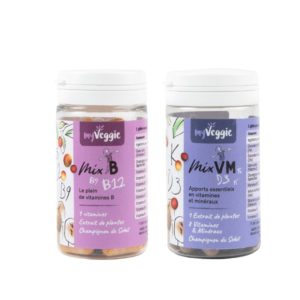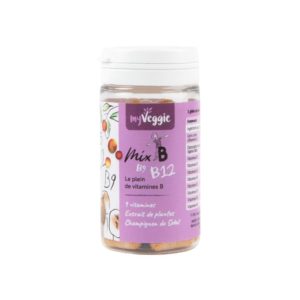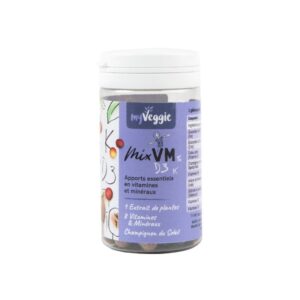Did you know that vitamin and mineral deficiencies affect more than one in three people worldwide?
Vitamins and minerals essential for good health.
Vitamins and minerals play an essential role in the proper functioning of your body. These essential nutrients play a crucial role in the proper functioning of our bodies, influencing everything from our daily energy to our long-term health.
In this guide you will discover the vital roles of vitamins and minerals and how to ensure optimal intake for your health & well-being.
Functions of vitamins and minerals essential to your health
The role of vitamins
Vitamins are essential for your body's proper functioning. They are involved in numerous biochemical processes, such as energy production, protein synthesis and cell repair.
There are two types of vitamin: water-soluble and fat-soluble. Water-soluble vitamins include vitamin C and the eight members of the vitamin B complex. They are dissolved in water, so are not stored in large quantities in the body and must be regularly supplied through the diet.
Fat-soluble vitamins include vitamins A, D, E and K. They are soluble in fat and can be stored in greater quantities in the body. Some good food sources for fat-soluble vitamins are oily fish, dairy products and green leafy vegetables.
The role of minerals
Minerals play a crucial role in the normal functioning of your body's cells. Certain minerals, such as calcium, magnesium, potassium and sodium, are involved in building and maintaining bones, muscle function, nerve transmission and the balance of fluids in your body.
Minerals fall into two categories: macrominerals and trace elements. Macrominerals include calcium, magnesium, potassium and sodium, and are required in relatively large quantities by your body. Trace elements, on the other hand, such as iron, zinc, copper and selenium, are required in smaller quantities, but are nonetheless essential to your health.
Minerals can be found in a variety of foods, such as dairy products, vegetables, fruit and meat. Make sure you eat a balanced diet to ensure an adequate intake of vitamins and minerals, in order to maintain good health.
The different types of vitamins and minerals
Fat-soluble vitamins
Fat-soluble vitamins are soluble in fats and include vitamins A, D, E and K. These vitamins are generally stored in your body. Here's a brief overview of these vitamins:
- Vitamin A: essential for vision, growth and the immune system.
- Vitamin D: necessary for bone health and calcium absorption.
- Vitamin E: plays a role in skin health, immune function and cell protection.
- Vitamin K: involved in blood coagulation and bone health.
Water-soluble vitamins
Water-soluble vitamins are soluble in water and include the 8 group B vitamins and vitamin C. They are not usually stored in your body, so it's important to include them regularly in your diet. Here are some of these vitamins:
- B vitamins: essential for energy metabolism, red blood cell formation and nervous system function.
- Vitamin C: important for the immune system, collagen synthesis and cell protection.
Major minerals
There are several major minerals your body needs, such as calcium, magnesium, sodium, potassium, chloride and phosphorus. These minerals are essential for many functions:
- Calcium: necessary for healthy bones and teeth, blood clotting and muscle function.
- Magnesium: important for nerves, muscles and heart function.
- Sodium and potassium: essential for fluid balance and nerve and muscle function.
Minerals trace elements
Trace minerals are necessary in small quantities for the proper functioning of your body. They include iron, iodine, chromium, copper, zinc, selenium, manganese and molybdenum. Each plays a specific role in your health, for example:
- Iron: transports oxygen in the blood and is involved in blood cell production.
- Copper: involved in red blood cell formation, nerve and immune system health.
- Zinc: important for growth, wound healing and the immune system.
By incorporating a variety of foods into your diet, you help to cover all your vitamin and mineral needs, which are essential for your well-being and health.
Vitamin and mineral deficiencies
Symptoms of vitamin deficiency
Vitamin deficiencies can lead to a variety of health problems. Here are some common symptoms of vitamin deficiency:
-
- Vitamin A: you may experience reduced night vision, dry skin and growth problems.
- Vitamin B1: you may experience fatigue, muscle weakness and nervous disorders.
- Vitamin B2: you may suffer from chapped lips, inflamed tongue and eye irritation.
- Vitamin B3: you may experience abdominal pain, fatigue and skin problems.
- Vitamin B6: you risk neurological disorders, irritability and anaemia.
- Vitamin B9: you may develop anaemia, fatigue and poor appetite.
- Vitamin B12: you may suffer from fatigue, shortness of breath and neurological problems.
- Vitamin C: you can easily get bleeding gums, fatigue and bruising.
- Vitamin D: you may experience bone pain, muscle weakness and poor dental health.
- Vitamin E: signs of deficiency include anemia, muscle degeneration, central nervous system disorders and asthenia.
- Vitamin K: you may experience excessive bleeding and poor blood coagulation.
Mineral deficiency symptoms
Mineral deficiencies can also cause health problems. Here are some common symptoms associated with mineral deficiencies:
- Calcium: your bone and dental health may be compromised, and you may be prone to muscle cramps.
- Iron: you may suffer from anemia, fatigue and shortness of breath.
- Magnesium: magnesium deficiency, which affects around 80% of the population, can cause fatigue, cramps and irritability.
- Potassium: you risk muscle weakness, cramps and cardiac arrhythmias.
- Zinc: you may have a weakened immune system, poor wound healing and skin problems.
It's important to know the symptoms of these deficiencies so you can identify them and take the appropriate steps to correct your diet. When in doubt, consult a health care professional.
Recommended vitamin and mineral intakes
To maintain good health, it's essential to know your recommended vitamin and mineral intakes. In this section, we'll explore the vitamin and mineral intakes you should aim to include in your daily diet.
Vitamin intake
Vitamins are essential nutrients for many of your body's vital functions. Here's a list of key vitamins and their recommended intakes:
- Vitamin A: 700 µg per day for men and 600 µg for women.
- B vitamins :
- B1 (Thiamine): 2.2 to 2.4 mg per day.
- B2 (Riboflavin): 1.4 mg for men and 1.1 mg for women.
- B3 (Niacin): 16 mg for men and 14 mg for women.
- B5 (Pantothenic acid): 5 mg per day for adults.
- B6 (Pyridoxine): 1.3 mg for men and 1.3 mg for women.
- B8 (Biotin): 30 µg per day for adults.
- B9 (folic acid): 400 µg per day for adults.
- B12 (Cobalamin): 2.4 µg per day for adults.
- Vitamin C: 75 mg for men and 60 mg for women.
- Vitamin D: 15 µg per day for adults.
- Vitamin E: 15 mg per day for adults.
- Vitamin K: 75 µg for men and 60 µg for women.
Mineral supplements
Minerals also play a crucial role in overall health and well-being. Here is a list of the main minerals and their recommended intakes:
- Calcium: 1000 mg per day for adults.
- Iron: 8 mg for men and 18 mg for women.
- Magnesium: 400 mg for men and 310 mg for women.
- Phosphorus: 700 mg per day for adults.
- Potassium: 2500 mg for men and 2000 mg for women.
- Sodium: 1500 mg per day for adults.
- Zinc: 11 mg for men and 8 mg for women.
By following these recommendations, you can ensure that your body receives the essential nutrients it needs to function optimally.
Nutritional supplements
Benefits
Vitamin and mineral supplements can help fill the gaps in your daily diet. For example, vitamin and mineral complexes are very popular dietary supplements designed to provide, in the right quantities, all the nutrients essential for good health. Here are just a few of the benefits of nutritional supplements:
- You can get enough essential vitamins and minerals, even when your diet is inadequate.
- Supplements can help support your overall health and strengthen your immune system.
- Taking supplements can also help overcome deficiencies in specific micronutrients, such as vitamin D and calcium.
Precautions
It is important to take precautions when using nutritional supplements:
- Choose quality supplements and check the labels to make sure they contain the nutrients you need.
- Consider possible interactions between supplements and medications you are already taking.
- Talk to your doctor or healthcare professional before you start taking supplements, especially if you're pregnant, breastfeeding or have a chronic health problem.
In short, vitamin and mineral supplements can help you overcome nutrient deficiencies and support your overall health.
Naturopathic advice
To maintain good health and preserve your energy, it's essential to eat a diet rich in vitamins and minerals. Here are a few naturopathic tips to help you optimize your intake of essential nutrients:
- Choose whole, unrefined foods. For example, choose wholegrain bread, semi-complete or wholegrain rice and wholegrain pasta. Refining causes foods to lose many of their vitamins and minerals, such as vitamins B1, B2, B3, B5, B6, vitamin E and minerals such as calcium and phosphorus.
- Eat a variety of fresh fruit and vegetables every day. They're rich in vitamins, minerals, trace elements and fiber. Choose fruits and vegetables that are in season and, if possible, organically grown.
- Limit your intake of stimulants such as coffee, tea and alcohol. They can upset your nervous balance and deplete your body of vitamins and minerals.
Conclusion on essential vitamins and minerals for your health
You now have a better understanding of vitamins and minerals and their importance to your health. Vitamins and minerals are essential nutrients that support your body's key functions, such as the immune system and cell renewal.
-
- Make sure you have a diversified diet that provides you with the necessary nutrients in sufficient quantities.
- Don't forget that supplements can be useful when your diet isn't rich enough in nutrients, or if you have specific needs that aren't being met by your diet.
By following these tips, you'll be well on your way to ensuring an adequate intake of vitamins and minerals and promoting optimal health.
Other articles to consult?
- https://myveggie.fr/vitamines-bios-veganes-indispensables-pour-sante-de-fer/
- https://myveggie.fr/vitamine-c-bienfaits-et-vertus-sante/
- https://www.vidal.fr/medicaments/substances/acide-ascorbique-26.html (2021)
- Eureka santé par Vidal (2014) Vitamin B12
Published by Véronique, founder of myVeggie













